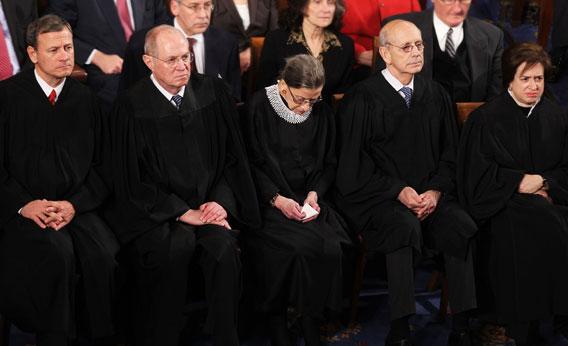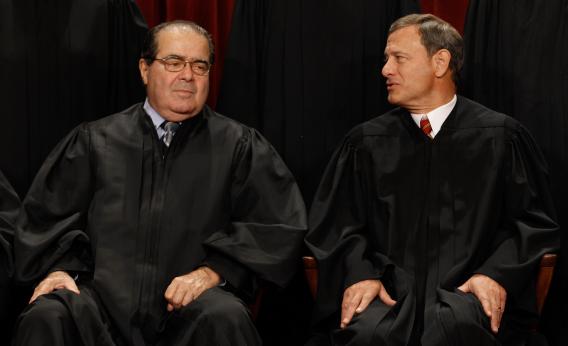Read Dahlia Lithwick's Award-Winning Supreme Court Coverage
Slate brings home a National Magazine Award for columns and commentary.
Slate is thrilled to announce that Senior Editor Dahlia Lithwick has been awarded a National Magazine Award for Columns and Commentary for her coverage of the Supreme Court’s handling of the Affordable Care Act. Lithwick is the first writer for an online publication to win an NMA in a print category.
Lithwick’s award-winning columns are excerpted below.

Photo by Alex Wong/Getty Images.
“It’s Not About the Law, Stupid: Forget precedent. Ignore Scalia’s musings. Next week’s health care argument before the Supreme Court is all about optics, politics, and public opinion.” Published March 22, 2012
Next week the Supreme Court will hear arguments over the Affordable Care Act, what many people know as Obamacare. The mainstream opinion is that this is unquestionably the most important case of this term. That opinion is no doubt supported by the attention it will receive—six hours of argument over three days. But amid all the throat-clearing, odds-making, and curtain-raising that surrounds next week’s health care case, it seems worth noting what is in dispute and what’s not. So let’s start by setting forth two uncontroversial propositions.
The first proposition is that the health care law is constitutional. The second is that the court could strike it down anyway. Linda Greenhouse makes the first point more eloquently than I can. That the law is constitutional is best illustrated by the fact that—until recently—the Obama administration expended almost no energy defending it. Back when the bill passed Nancy Pelosi famously reacted to questions about its constitutionality with the words, “Are you serious?” And the fact that the Obama administration rushed the case to the Supreme Court in an election year is all the evidence you need to understand that they remain confident in their prospects. The law is a completely valid exercise of Congress’ Commerce Clause power, and all the conservative longing for the good old days of the pre-New Deal courts won’t put us back in those days as if by magic. Nor does it amount to much of an argument.
Read the rest of Lithwick’s column.

Photo by Chip Somodevilla/Getty Images.
“The Supreme Court’s Dark Vision of Freedom: The court’s conservatives apparently believe in the land of the free. Circa 1804.” Published Tuesday, March 27, 2012.
The fight over Obamacare is about freedom. That’s what we’ve been told since these lawsuits were filed two years ago, and that’s what we heard both inside and outside the Supreme Court this morning. That’s what Michele Bachmann* and Rick Santorum have been saying for months. Even people who support President Obama’s signature legislative achievement would agree that this debate is all about freedom—the freedom to never be one medical emergency away from economic ruin. What we have been waiting to hear is how members of the Supreme Court—especially the conservative majority—define that freedom. This morning, as the justices pondered whether the individual mandate—that part of the Affordable Care Act that requires most Americans to purchase health insurance or pay a penalty—is constitutional, we got a window into the freedom some of the justices long for. And it is a dark, dark place.
It’s always a bit strange to hear people with government-funded single-payer health plans describe the need for other Americans to be free from health insurance. But after the aggressive battery of questions from the court’s conservatives this morning, it’s clear that we can only be truly free when the young are released from the obligation to subsidize the old and the ailing. Justice Samuel Alito appears to be particularly concerned about the young, healthy person who “on average consumes about $854 in health services each year” being saddled with helping pay for the sick or infirm—even though, one day that will describe all of us. Or as Justice Antonin Scalia later puts it: “These people are not stupid. They're going to buy insurance later. They're young and need the money now.” (Does this mean that if you are young and you pay for insurance, Scalia finds you “stupid”?)
Read the rest of Lithwick’s column.

Photo by Chip Somodevilla/Getty Images
“Where Is the Liberal Outrage? Conservatives are pillorying John Roberts for his health care decision. Why don’t liberals get angry when their justices fail to deliver?” Published Friday, July 6, 2012.
Depending on whether you generally prefer your vitriolic abuse from the left or the right, it’s been a tough week for Chief Justice John Roberts. Having given conservatives the sun, the moon, and the stars for seven years, Roberts suddenly finds himself on the wrong side of everyone from the Washington Post’s Marc Thiessen, to the Wall Street Journal’s John Yoo, to presidential hopeful Mitt Romney, who not only returned the chief justice’s class ring and football jacket yesterday, but also vowed to only date future justices who are, well, a carbon copy of Mitt Romney.
In contrast to all the weeping and wailing that has accompanied what appears to be John Roberts’ single significant defection since joining the court, liberals have been strangely silent—as they are always strangely silent—about the myriad ways in which the liberal justices have disappointed them this term. Oh sure, we get a little eye-roll from Elizabeth Warren over Justice Elena Kagan’s vote in the Medicaid expansion part of the Affordable Care Act cases. But looked at in its entirety, the 2011 term was yet another festival of defections by assorted members of the so-called liberal wing.
Read the rest of Lithwick’s column.